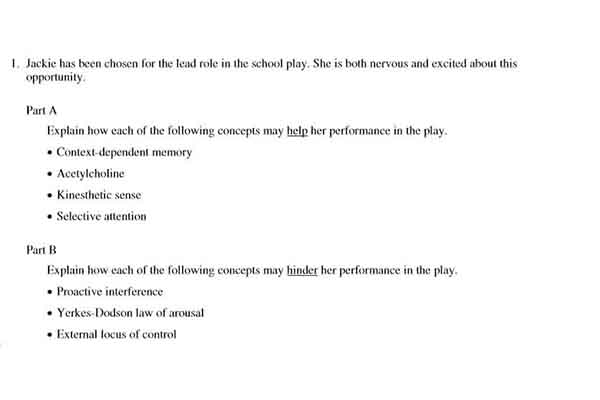
还有几个月就是AP大考了,同学们目前就要利用这几个月的时间好好复习,本期给大家带来一些AP心理学FR真题真题,这些真题可是同学们最好的复习资料,同学们一定要搞懂每一小题的讲解,争取在考试中考出满意的成绩。

PART A
Point 1: Context-dependent memory
It is an effect of context on memory. Putting yourself back in the context where you experienced something can prime your memory retrieval. If Jackie acts the play on the same stage where she used to practice, it will help her performance better.
解析
1.Context-dependent memory是依赖外部线索(身临其境)影响信息提取(recall)的一种效应,它本身不是一种记忆类型;
2.注意Context-dependent memory与State-dependent memory的区别:前者是相同环境下有助于回忆,后者相同状态下有助于回忆。前者是外部线索,后者是内部状态(情绪或醉酒等);
3.没有Mood-dependent memory这个terms,很多同学会搞混,只有mood congruent(心境一致性),记忆或多或少总是与心境保持一致的,所以当你在积极情绪下学习的东西,在相同积极情绪下更能有效回忆。
Point 2: Acetylcholine
Acetylcholine is the kind of neurotransmitter specify in learning and memory. It also enables muscle action. Jackie is a healthy person whose body releases several types of neurotransmitter especially ACh, that would help her control her muscle and make a dramatic performance. In addition, she is likely to have a good memory with the benefit of ACh, which will help her better remember the lines and learn quickly in her school play.
解析
此题考查Ach的功能(muscle action/learning /memory),选择1-2种功能均可得分,但是需要结合题目举例进一步解释说明。
Point 3: Kinesthetic sense
Kinesthetic sense gives us the position and orientation of specific body parts. During repeated practice, the receptors in Jackie’s muscles send to her brain. The information, combined with visual feedback, lets Jackie keep track of her body. She can use more
precise movements and her muscles move together when she perform in a school play.
解析
Kinesthetic sense和Vestibular sense都是body position senses.前者是动觉,后者是静觉。前者负责反映身体各个部分的位置、运动以及肌肉的收缩,帮助人们更好的协调动作,完成复杂的运动技能,后者负责帮助人们实现身体的平衡。
Point 4: Selective attention
Through selective attention , your awareness focuses on a particular stimulus.When Jackie is practicing, many outside stimulus such as the sound of some noisy outside the room are irrelevant to her. However,she focuses on her performance.
解析
本题非常简单,考察择性注意如何帮助人们集中注意力,高效工作。
PART B
Point 5: Proactive interference
Older information learned previously interferes with the recall of information learned more recently. If Jackie used to participate in other plays, memory of her previous roles may cause a difficulty in performing this latest one.
解析
1.遗忘的原因有衰退说和干扰说两种,此处考察的是干扰说。人们认为遗忘是因为学习和回忆之间受到其他刺激的干扰。
2.Proactive interference与Retroactive interference是两种干扰的形式,比较容易理解,但也很容易混淆,大家可以根据词根Pro和Re理解性记忆,历年曾多次考察过原题。
Point 6: Yerkes–Dodson law of arousal
The Yerkes–Dodson law is a relationship between state of arousal and performance. In general, most of us perform best with an optimum level of arousal, although this varies with different activities. We might perform well at an easy task with a very high level of arousal ,but the same high level of arousal would prevent us from performing well on a difficult task. If Jackie is too nervous about the play, and she may end up doing bad in the performance.

解析
1.分清arousal theory 与Yerkes–Dodson law的区别。前者是动机的唤醒理论,强调人类行为的动机是因为追求最佳唤醒水平(这里可以是一种生理激活状态,即适度的焦虑)。后者是基于动机唤醒理论下细分出的定律,强调动机的最佳唤醒水平与工作任务难度有关。
2.Yerkes–Dodson law是倒U型曲线,强调中等刺激强度的动机有利于任务的完成。
3.倒U型曲线的横坐标可以是motivation/arousal level/anxiety等,都代表生理唤醒水平,只是在不同情境下叫法不同,纵坐标可以是performance/worked efficiency。
Point 7: External locus of control
A person with external locus of control tends to attribute their achievement to variables in the environment, such as other’s performance, society, and fate. When Jackie has an unpleasing performance during her rehearsal, external locus of control may lead her to blame other actor’s flaws instead of introspecting herself for space of improvement. She may not perform well in the end.
解析
本题考察动机归因理论,比较简单,07年真题也出过原题,需要分清内控和外控型人在成败归因中的不同:内控型认为成败是个人原因造成,外控型人则认为成败是外部原因造成。由于人格类型不同,归因不同,最终对成败的理解也不同。
以上几道真题同学是否都能做出来呢?如今AP成绩也能够申请牛剑G5大学了,所以如果您想进入优质院校的话,AP成绩可是非常重要的,想要在AP大考中,考出好成绩吗?赶紧来参加唯寻AP冬季复习班,让您AP各个国际课程门门开花。点击【预约试听】即可报名!

点击
AP心理学复习资料推荐 除了资料外你的 AP心理学复习时间安排好了吗?
查看更多。

学习有方法,成长看得见
筑梦牛剑/G5/常春藤
